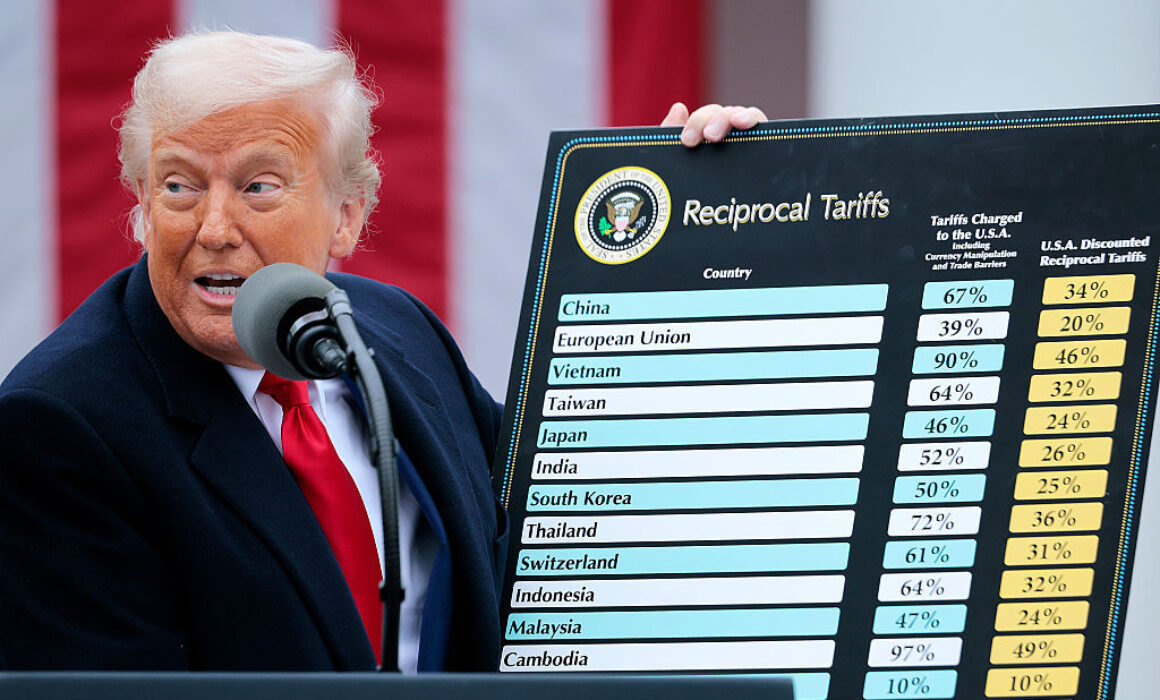The Fallout from “Liberation Day”
April 4, 2025
Tariff policy doesn’t have to work like this.
The Roosevelt Rundown features our top stories of the week.

Donald Trump holds up a chart while speaking during a “Liberation Day” event at the White House on April 2, 2025. (Chip Somodevilla/Getty Images)
Arbitrary Tariffs, Real Damage
On Wednesday, President Trump announced a sweeping new tariff regime that sent shockwaves across global markets.
The 10 percent baseline tariff affects “nearly all countries with which the US has normal trading relations, including countries with which the US has trade deficits, trade surpluses, and trade balance. It includes countries that charge the US high tariffs, low tariffs, or no tariffs,” Todd N. Tucker, director of Roosevelt’s industrial policy and trade program, writes in a new brief. “In other words, this is the universal baseline tariff that Trump campaigned on—not anything that could be properly termed reciprocal.”
Tucker has written extensively on trade policy and specifically on how targeted tariffs can be leveraged to achieve specific goals—but that’s not what’s happening here. The rates the Trump administration set for various countries appear to be largely arbitrary, and although Trump claims that emergency powers give him the executive authority to unilaterally impose tariffs, no legitimate threat underpins these.
“The real problem with Trump’s so-called Liberation Day tariffs is that they’re not smart or targeted, and will thus be inflationary across the board—rather than aiding strategic industries relative to the rest of the economy,” Tucker writes. “There’s not even minimal reasoning behind them—much less a comprehensive industrial strategy or rudimentary cost-benefit analysis.”
It remains to be seen whether judicial or legislative authorities will step in to halt the tariffs or if the Trump administration will back down in response to the economic fallout. As Roosevelt Principal Economist Michael Madowitz told Quartz earlier this week, “The Trump administration’s track record gives little reason to believe that April 2 will mark the end to ambiguity on trade.”
Read the full brief: “Trump’s Tariff Tantrum: How Sweeping Tariffs Came to Be and Why It Matters” and Tucker’s conversation with Good Authority editor Alexandra Guisinger: “Good Chat: About Those Trump Tariffs . . .”
Roosevelt Institute Book Club Presents: The Master’s Tools
Former Roosevelter Michael A. McCarthy joined Think Tank Director Hannah Groch-Begley on Wednesday to discuss his new book, The Master’s Tools: How Finance Wrecked Democracy (And a Radical Plan to Rebuild It).
Recounting how the financial sector has for decades consolidated economic and political power by wresting control of pensions and retirement funds away from working people, McCarthy said, “We’ve seen working-class wealth siphoned off into these speculative schemes for return at the expense of investments into things that most people would think of as providing a good overall life—things like housing, community wealth, nice parks to go to.”
What’s the solution? McCarthy proposes a system of random selection, like jury duty, to empower the beneficiaries of financial products to make decisions about how they are invested, with the overall goal of democratizing our financial system.
What We’re Talking About
What We’re Reading
- Employment numbers are becoming more difficult to forecast as various economic metrics destabilize and risks accumulate. “If the hard data starts to come through half as bad as the soft data looks right now, then this would not suggest a small recession, this would be a large recession,” Roosevelt’s Michael Madowitz told Barron’s.
- Roosevelt Fellow Ned Resnikoff applauded a plan to pioneer “Paris-style zoning” in Cambridge, Massachusetts, to tackle the city’s housing shortage.
- For more on strategies to achieve abundant housing, see “Abundance That Works for Workers—and American Democracy” from Kate Andrias and Alexander Hertel-Fernandez.
- The Supreme Court is considering a case about whether South Carolina can deny Medicaid coverage for patients who seek care at Planned Parenthood.
- “For the anti-abortion movement, the idea is not just to end abortion in South Carolina. It’s to end it everywhere,” Roosevelt Fellow Rachel Rebouché told The Cut. “As it pursues that goal, it’s going to come into conflict with federal programs that support non-abortion services as well as with states that protect reproductive rights. We’re just seeing the tip of the iceberg of the conflict over abortion intensifying.”
- Republicans are using antitrust law to go after companies that work together on green initiatives, accusing them of colluding against the fossil fuel industry.
